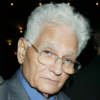Jacques Derrida

Jacques Derrida
Jacques Derridawas a French philosopher, born in Algeria. Derrida is best known for developing a form of semiotic analysis known as deconstruction, which he discussed in numerous texts, and developed in the context of phenomenology. He is one of the major figures associated with post-structuralism and postmodern philosophy...
ProfessionPhilosopher
Date of Birth15 July 1930
cinema ghost plus
Cinema plus Psychoanalysis equals the Science of Ghosts.
what-if doubt secret
But because me and myself, as you no doubt are well aware, we are going to die, my relation—and yours too—to the event of this text, which otherwise never quite makes it, our relation is that of a structurally posthumous necessity. Suppose, in that case, that I am not alone in my claim to know the idiomatic code (whose notion itself is already contradictory) of this event. What if somewhere, here or there, there are shares in this non-secret’s secret? Even so the scene would not be changed. The accomplices, as you are once again well aware, are also bound to die.
loving-someone expectations heidegger
Even if we're in a state of hopelessness, a sense of expectation is an integral part of our relationship to time. Hopelessness is possible only because we do hope that some good, loving someone could come. If that's what Heidegger meant, then I agree with him.
men limits infinity
The end of man (as a factual anthropological limit) is announced to thought from the vantage of the end of man (as a determined opening or the infinity of a telos ). Man is that which is in relation to his end, in the fundamentally equivocal sense of the word. Since always.
writing order years
During the fifteen or twenty years in which I tried - it was not always easy with publishers, newspapers, etc. - to forbid photographs, it was not at all in order to mark a sort of blank, absence, or disappearance of the image; it was because the code that dominates at once the production of these images, the framing they are made to undergo, the social implications (showing the writer's head framed in front his bookshelves, the whole scenario) seemed to me to be, first of all, terribly boring, but also contrary to what I am trying to write and to work on.
thinking analysis fields
I would say that deconstruction is affirmation rather than questioning, in a sense which is not positive: I would distinguish between the positive, or positions, and affirmations. I think that deconstruction is affirmative rather than questioning: this affirmation goes through some radical questioning, but it is not questioning in the field of analysis.
children unveiling firsts
I am like a child ready for the apocalypse, I am the apocalypse itself, that is to say, the ultimate and first event of the end, the unveiling and the verdict.
identity looks cry
Each time this identity announces itself, someone or something cries: Look out for the trap, youre caught. Take off, get free, disengage yourself.
teaching school anxiety
Still today, I cannot cross the threshold of a teaching institution without physical symptoms, in my chest and my stomach, of discomfort or anxiety. And yet I have never left school.
writing language traditional
The traditional statement about language is that it is in itself living, and that writing is the dead part of language.
ambition mean writing
The trace I leave to me means at once my death, to come or already come, and the hope that it will survive me. It is not an ambition of immortality; it is fundamental. I leave here a bit of paper, I leave, I die; it is impossible to exit this structure; it is the unchanging form of my life. Every time I let something go, I live my death in writing.
ironic irony said
What cannot be said above all must not be silenced but written.
philosopher scientist easier
Why is it the philosopher who is expected to be easier and not some scientist who is even more inaccessible?
believe ideas differences
As soon as we cease to believe in such an engineer and in a discourse which breaks with the received historical discourse, and as soon as we admit that every finite discourse is bound by a certain bricolage and that the engineer and the scientist are also species of bricoleurs , then the very idea of bricolage is menaced and the difference in which it took on its meaning breaks down.